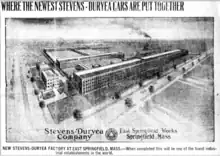The automotive industry in Massachusetts refers to a period of time from 1893 to 1989 when automobiles were manufactured in the Commonwealth of Massachusetts commercially. In the early years, the state produced more automobiles than Detroit, Michigan.[1] During the 20th century, General Motors and the Ford Motor Company were producing automobiles at the Framingham Assembly and Cambridge Assembly (later moved to the Somerville Assembly), respectively.
History
Early years
Western Massachusetts

On September 20, 1893, Charles and Frank Duryea of Springfield, Massachusetts, built and then road-tested the first-ever American, gasoline-powered car in Springfield.[2] During these years, many independent manufacturers built automobiles in the state.[1] In 1900, Springfield was joined by Skene, and Knox Automobile, which survived until 1927 as manufacturers of automobiles.[3] In 1905, Knox famously produced America's first motorized fire engines for the Springfield Fire Department—the first modern fire department in the world.[4] Stevens-Duryea also built cars in East Springfield, from 1901 to 1915, and again from 1919 to 1927. After hitting hard times in 1915, the plant was sold to the New England Westinghouse Company in 1915.[5][6]
In the 1920s, Rolls-Royce America decided to also start manufacturing in the city, stating, "The artisans of Springfield—from long experience in fine precision work—were found to possess the same pride in workmanship as the craftsmen of England."[7] From 1921 until 1931, the company's only foreign plant was located in Springfield, off of Hendee Street. It assembled nearly three thousand Silver Ghosts and Phantoms.[8] The Rolls-Royce factory is adjacent to the former Indian Motorcycle manufacturing plant.[9][10]
Eastern Massachusetts

The H.H. Buffum Company produced the Buffum from 1901 to 1906 in Abington.[11] From 1902-1908, the Waltham Manufacturing Company produced the Orient, until it was reorganized as the Metz Company in 1908.[12][13] The Crest Manufacturing Company produced the Crestmobile around 1904, although there is no .[14] The Corwin Manufacturing Company manufactured the Gas-au-lec in Peabody between 1905 and 1906.[15] The Pope Manufacturing Company also produced automobiles in Hyde Park, including the Pope-Hartford (1903-1914), Pope-Robinson, Pope-Toledo (1903-1909), Pope-Tribune (1904-1907) and Pope-Waverley.[16]
The Ford Motor Company opened Cambridge Assembly in 1913, and manufactured vehicles there until 1926, when it opened Somerville Assembly.[17][18][19]
Great Depression and World War II
The Great Depression ended up closing many plants nationally. In Springfield, Rolls-Royce America decided to close their plant rather than retool it.[8]
Post-war years
During the post-war years, manufacturing boomed in the state. General Motors opened Framingham Assembly in 1947. In 1958, Somerville Assembly was closed by Ford, following the failure of the Ford Edsel.[18]
End of major manufacturing
In 1983, General Motors, decided to idle, then shutter, the Framingham Assembly, citing its small size and issues with town leaders.[20][21][22] The plant was later shut down in 1989 (labor contracts prohibited closing the plant until 1990), laying off 2,100 workers, down from a peak of 5,000 from Connecticut, New Hampshire, Rhode Island, and Massachusetts.[23] This brought to an end to commercial car manufacturing in the state.
See also
References
- 1 2 Kennedy, George (September 13, 2013). "Boston Cup Celebrates Cars Made in Mass". The Boston Globe. Retrieved December 22, 2013.
- ↑ Georgano, G. N. (1985). Cars: Early and Vintage, 1886–1930. London: Grange-Universal. ISBN 0517480735.
- ↑ Hess, John Y. (2002). Knox Automobile Company. Images of America. Charleston, SC: Arcadia. ISBN 9780738504995.
- ↑ "Firsts". Springfield 375. 2011. Archived from the original on May 21, 2013. Retrieved December 22, 2013.
- ↑ Wise, David Burgess. "Stevens-Duryea: A Very Limited Company", in Ward, Ian, executive editor. World of Automobiles (London: Orbis Publishing), Volume 19, p.2188.
- ↑ Electrical World (New York, N.Y. : 1906), Volume 74, Issues 1-13. Electrical World. 1919.
- ↑ Juravich, Tom, ed. (2007). The Future of Work in Massachusetts. Amherst: University of Massachusetts Press. p. 74. ISBN 978-1558496071.
The artisans of Springfield—from long experience in fine precision work—were found to possess the same pride in workmanship as the craftsmen of England.
- 1 2 "History". Rolls-Royce North America. 2004. Archived from the original on December 9, 2004. Retrieved December 22, 2013.
- ↑ "Springfield Massachusetts August 1999". Cycletownusa.com. Archived from the original on April 29, 2014. Retrieved 16 January 2014.
- ↑ Kinney, Jim (March 21, 2011). "Titeflex razes factory that once housed Rolls-Royce's Springfield manufacturing operation". Springfield Republican. Retrieved January 16, 2014.
- ↑ Georgano, Nick (2000). The Beaulieu Encyclopedia of the Automobile. London: Stationery Office. p. 1792. ISBN 0117023191.
- ↑ Kimes, Beverly Rae; Clark Jr, Henry Austin (1996). Standard Catalog of American Cars: 1805–1942. Iola, WI: Krause Publications. p. 1511. ISBN 978-0-87341-428-9.
- ↑ A directory of Massachusetts manufactures, Boston: Wright & Potter, 1913, OL 7134711M
- ↑ Frank Leslie's Popular Monthly (January 1904)
- ↑ Clymer, Floyd. Treasury of Early American Automobiles, 1877-1925 (New York: Bonanza Books, 1950), p.158.
- ↑ "American Automobiles - Manufacturers". Farber and Associates, LLC - 2011. Archived from the original on September 3, 2011. Retrieved August 28, 2011.
- ↑ "Building History". 640 Memorial Drive. Retrieved December 22, 2013.
- 1 2 "Squares and Neighborhoods: Assembly Square". City of Somerville. Archived from the original on December 8, 2013. Retrieved December 22, 2013.
- ↑ "Ford Motor Company Assembly Plant, 640 Memorial Drive, Cambridge, Middlesex County, MA". Library of Congress. Retrieved January 15, 2014.
- ↑ Patterson, Gregory A. (February 4, 1987). "GM to Close Framingham Plant". The Boston Globe. p. A1.
- ↑ Beam, Alex (November 15, 1987). "The Two Faces of Tony Colonna". The Boston Globe. p. A1.
- ↑ Kranish, Michael; Mohl, Bruce (November 5, 1987). "GM to Close Framingham Plant Nov. 30: 3,700 to be put out of work". The Boston Globe. p. A1.
- ↑ Ross, Philip (February 2, 1989). "G.M. to Shut Its Plant Near Boston". The New York Times. Retrieved January 16, 2014.